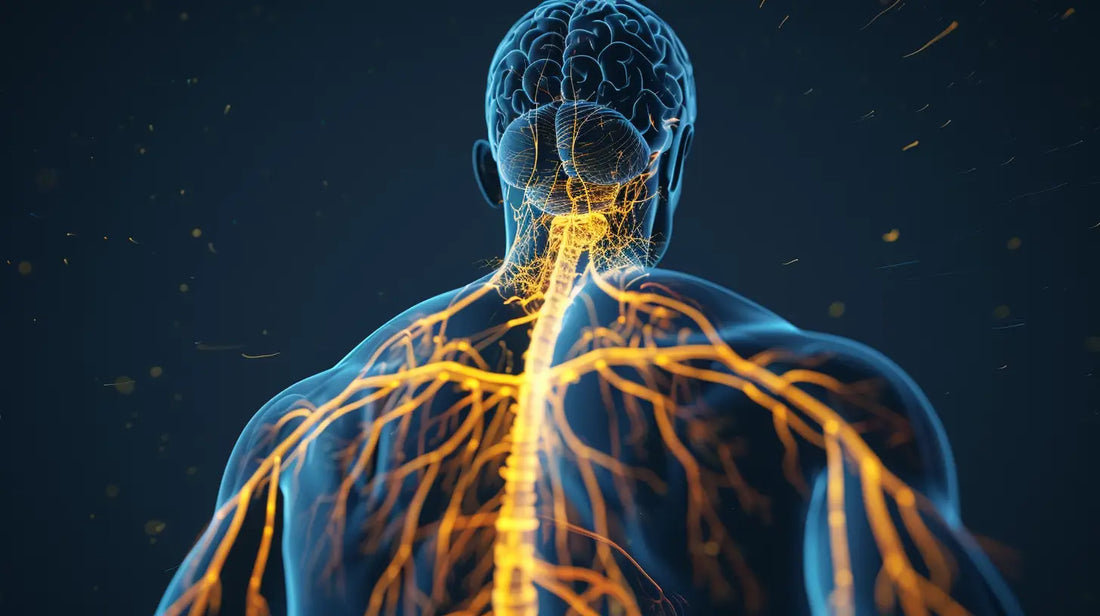
Poor blood circulation; how to improve it
Share
In this article, we'll cover proven methods and unexpected tips to boost your blood circulation. For example, did you know that walking barefoot on dewy morning grass can help activate circulation in your legs? Or that laughing out loud at your favorite sitcom can have a positive impact on your veins and arteries?
Join us to explore original and effective tips to improve your blood circulation and regain optimal quality of life.
Summary : Poor blood circulation refers to difficulties for blood to flow efficiently through veins and arteries, often due to various factors such as a sedentary lifestyle, obesity or certain medical conditions. This problem can lead to symptoms such as heavy legs, varicose veins, or cramps, significantly affecting quality of life.
Discover our ranges of supplements
dedicated to better blood circulation
What is poor blood circulation?
Poor blood circulation is a term that makes many people shudder. But what does this actually mean? Imagine the highways and roads of our vast country, with cars and trucks (representing the blood) moving freely, supplying the cities and towns (our organs) with vital resources. When these roads are congested or narrowed, travel becomes more difficult and slow, sometimes causing unwanted accumulations. Similarly, in our body, when blood cannot circulate freely through the veins and arteries, symptoms such as heavy legs, numbness or even varicose veins can appear.
This phenomenon, often underestimated, affects a significant part of the population, with varied risk factors including a sedentary lifestyle, obesity, or certain conditions such as diabetes. A sedentary lifestyle, for example, is a modern scourge contributing greatly to this problem, reminding us of the importance of moving and not sitting too long in front of our screens. By better understanding what poor blood circulation is, we can take steps to improve it, taking a step towards better overall health.
Common causes of poor blood circulation
Various factors can slow the flow of blood through our veins and arteries, creating what is commonly called poor blood circulation. Among the usual culprits is the sedentary lifestyle, which in our modern society has never been more prevalent. Yes, spending your days sitting in front of a computer certainly doesn't help the blood to flow happily through our body.
Add to this an unbalanced diet, rich in trans fats and sugar, which can contribute to the accumulation of atherosclerotic plaques on the walls of the arteries. Overweight and obesity, by increasing pressure on the veins, exacerbate the problem. Without forgetting smoking, which, by damaging the vein walls, acts as a real brake on optimal circulation.
Other factors include medical conditions such as diabetes, which can cause damage to blood vessels, and certain genetic dispositions that make us more susceptible to circulatory problems. So, a combination of these elements can put a strain on our blood circulation, reminding us of the importance of taking care of our body through a healthy and active lifestyle.
Discover our ranges of supplements
dedicated to better blood circulation
Symptoms and signs of blood circulation problems
When our blood circulation is poor, our body does not fail to send us warning signals. Symptoms can vary from a feeling of heavy legs at the end of the day, a classic among those who toil behind a desk, to nighttime cramps that wake you up with a start. Imagine your leg turning into hardwood in the middle of the night, pretty unpleasant, right?
Varicose veins, these veins that start to dance under the skin, particularly on the legs, are another unmistakable sign. They are not just an aesthetic concern, but a cry for help from your venous system. And let's not forget swollen feet and ankles, as if you've walked for miles under the blazing sun, an often underestimated symptom.
All these signals are invitations to revisit our lifestyle and to consider natural solutions or dietary supplements to get blood circulation back on the right path.
Discover our ranges of supplements
dedicated to better blood circulation
Improve blood circulation through diet: Top 5 best foods
To give your blood circulation a boost, there is no need to look for complicated solutions. Sometimes the answer lies on our plate. Here are the top 5 champion foods to keep your veins and arteries in Olympic shape.
Firstly, red vine, known for its virtues on the veins, acts as a venous tonic. Then, don't forget dark chocolate (in moderation!), rich in flavonoids, which promote the dilation of blood vessels. Ginger, this long-time ally in stimulating blood flow, deserves its place in your diet. Watermelon, full of lycopene, is a natural diuretic that fights hypertension. Finally, garlic, this little bulb with great virtues, reduces blood pressure and prevents the formation of plaque in the arteries.
Integrating these foods into your daily life could not only brighten up your days but also give new impetus to your blood circulation. Who knew that eating healthy could be so beneficial for your veins and arteries?
The importance of physical activity for venous and arterial health
Engaging in regular physical activity is a true elixir of youth for your veins and arteries. It's a bit like giving your circulatory system a spa session: necessary relaxation and equally essential strengthening.
Moving allows your heart to pump blood efficiently to every corner of your body, helping to maintain the elasticity of blood vessels. Walking, running, swimming, or even practicing yoga, each movement counts and acts as a beneficial caress for your venous and arterial health.
An interesting fact to note: physically active people have better blood circulation than those leading a sedentary lifestyle. This is not just a coincidence, but a scientifically proven reality. So, put on your sneakers and do some good to your veins and arteries, one step at a time. Your blood circulation will thank you, and your general well-being will be greatly improved.
Discover our ranges of supplements
dedicated to better blood circulation
Food supplements: a solution to boost your blood circulation
In the quest for optimized blood circulation, food supplements position themselves as faithful allies. Imagine them as boosters, little helping hands that we offer our body to help it stay on course. Among the stars of this category, red vine, ginger, and garlic take the top spot, each contributing its contribution to stimulating blood circulation.
These supplements, often derived from ancestral wisdom and validated by modern science, act synergistically to strengthen the walls of the veins and facilitate blood flow. Their use, in perfect harmony with a balanced diet and regular physical activity, can prove to be a powerful lever for those seeking to boost their blood circulation.
However, before you start consuming them, a quick appointment with your health practitioner is necessary, for a personalized and safe approach. So, armed with these precious allies, you are ready to face the challenge of poor blood circulation with confidence and serenity.
Relaxation and stress management techniques for better circulation
Did you know that stress can be a major obstacle to good blood circulation? Yes, when we are under pressure, our body tends to tense up, thus hindering natural blood flow. This is where relaxation and stress management techniques come into play, like magic keys opening the way to better circulation.
Meditation, yoga, or even simple deep breathing exercises can help release accumulated tension and promote better blood oxygenation. Imagine your stress evaporating during a gentle yoga session, your circulation will immediately improve. These practices, in addition to being special moments for oneself, activate the parasympathetic system, thus promoting relaxation and smooth blood circulation.
Incorporating these moments of relaxation into your daily routine could not only improve your general well-being but also breathe new life into your veins and arteries. One more reason to take care of yourself, right?
Discover our ranges of supplements
dedicated to better blood circulation
When to consult a healthcare professional for blood circulation problems?
Knowing when to contact a healthcare professional for blood circulation problems is a bit like reading the signals our own body sends us. When symptoms such as heavy legs, persistent pain or varicose veins begin to seriously impact your quality of life, it is time to consult. If home methods and lifestyle changes do not bear fruit, medical advice becomes essential.
A health professional will be able to assess the severity of your situation using specific examinations and direct you towards the most appropriate treatment. This is not only about improving your daily comfort but also preventing possible more serious complications, such as venous thrombosis. This appointment is also an opportunity to explore options for safe food supplements adapted to your situation.
Do not let embarrassment or the trivialization of these symptoms delay this visit. As they say here, “prevention is better than cure”!
Discover our ranges of supplements
dedicated to better blood circulation
Frequently asked questions & answers
What are the signs of poor blood circulation?
Signs include feeling of heavy legs, cramps, varicose veins, swelling of the feet and ankles, and sometimes pain. Poor circulation can also cause color changes in affected areas, such as a bluish or pale tint to the skin.
What are the main causes of poor blood circulation?
The main causes are sedentary lifestyle, obesity, smoking, certain medical conditions like diabetes, and genetic factors. Age and an unbalanced diet can also play a role in the appearance of this problem.
How can you improve blood circulation naturally?
Improving your blood circulation can be achieved through a diet rich in fruits and vegetables, regular exercise, reducing stress through relaxation techniques, and maintaining good hydration. Certain foods like ginger, dark chocolate, and green tea are also known for their benefits on circulation.
What role do dietary supplements play in improving blood circulation?
Food supplements, such as those based on red vine, ginger, or garlic, can support and promote better blood circulation. They work by helping to strengthen the walls of veins and arteries and improving blood flow, but should be used as a complement to a healthy lifestyle.
When should you consult a healthcare professional for blood circulation problems?
It is advisable to consult a healthcare professional when symptoms of poor circulation persist despite lifestyle changes, worsen, or if new symptoms appear. This allows more serious medical conditions to be ruled out and appropriate treatment to be obtained.
